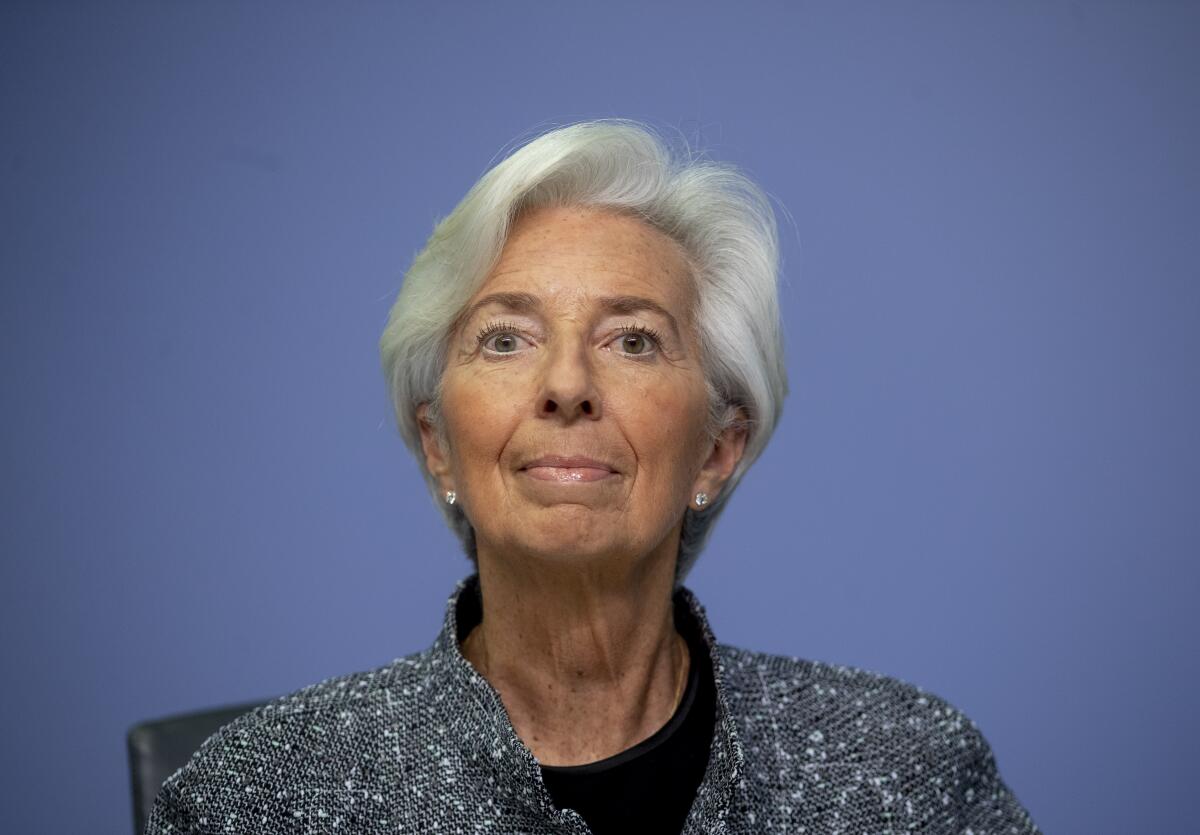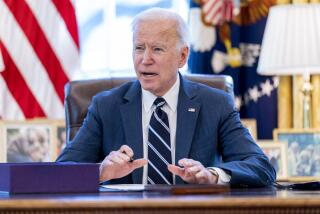European Central Bank nearly doubles its coronavirus support scheme

- Share via
FRANKFURT, Germany — The European Central Bank has boosted its coronavirus emergency support program by an unexpectedly large 600 billion euros to 1.35 trillion euros ($1.5 trillion) in an effort to keep affordable credit flowing to the economy during the steep downturn caused by the virus outbreak.
The new stimulus comes on top of added spending by European governments and similar efforts by the U.S. Federal Reserve, the Bank of England, the Bank of Japan and others around the globe as the world tries to cope with a sharp, simultaneous blow to both developing and rich economies.
The central bank for the Eurozone, comprising the 19 countries that use the euro, also extended its monetary stimulus program from the end of 2020 to at least the end of June next year.
The bank expects the Eurozone economy to shrink by a painful 8.7% this year and to recover by a more modest 5.2% in 2021. ECB President Christine Lagarde warned that “the speed and scale of the rebound are highly uncertain.”
Lagarde removed a face mask as she walked into an empty press room Thursday at the bank’s skyscraper headquarters in Frankfurt for the online news conference after the policy meeting of the bank’s 25-member governing council, which was conducted by teleconference.
She cautioned that even though lockdown measures are being eased, a significant rebound was not yet in sight.
“While survey data and real-time indicators for economic activity have shown some signs of a bottoming-out alongside the gradual easing of the containment measures, the improvement has so far been tepid compared with the speed at which the indicators plummeted in the preceding two months,” she said.
A looming recession due to the coronavirus imperils Champagne, buffalo mozzarella and other European delicacies. They’re luxuries but also livelihoods.
The ECB’s moves in many ways reflect similar concerns to those motivating the Fed, which has slashed short-term interest rates to near zero and started buying $2 trillion in Treasury securities and mortgage-backed bonds to keep credit markets functioning.
Under the coronavirus support program, the ECB buys corporate and government bonds and other financial assets from banks, paying with newly created money. That helps lower longer-term interest rates, keeping the pandemic from drying up needed funding for borrowers.
The large size of the intended purchases also sends a signal to financial markets that the ECB is determined to ensure interest rates remain low throughout the Eurozone and prevent borrowing costs from rising for indebted governments such as Italy.
While the ECB says its purchases are not targeted at supporting Italy, the program so far bought a larger share of Italian bonds than other countries’ and is credited with keeping market pressure off a nation that has been among the hardest hit by the pandemic.
The support from the ECB comes on top of up to 540 billion euros in financial aid from Eurozone governments that includes credit lines from the euro bailout fund, as well as a longer-term EU recovery fund of 750 billion euros that is still being worked out. Germany, the largest member economy, on Wednesday proposed an additional 130 billion euros of stimulus including tax breaks and subsidies for buying electric cars.
More to Read
Sign up for Essential California
The most important California stories and recommendations in your inbox every morning.
You may occasionally receive promotional content from the Los Angeles Times.














